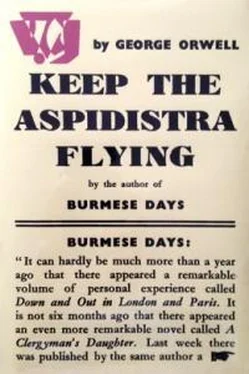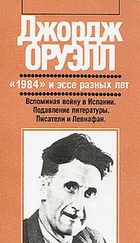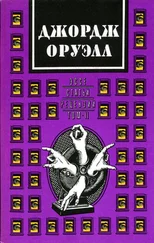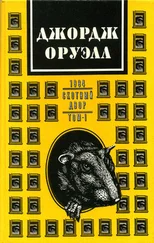When he had gone another fifty yards the rhyme for the final stanza of his poem occurred to him. He walked homeward, repeating the poem to himself:
Sharply the menacing wind sweeps over The bending poplars, newly bare, And the dark ribbons of the chimneys Veer downward; flicked by whips of air,
Torn posters flutter; coldly sound The boom of trains and the rattle of hooves, And the clerks who hurry to the station Look, shuddering, over the eastern rooves,
Thinking, each one, 'Here comes the winter! Please God I keep my job this year!' And bleakly, as the cold strikes through Their entrails like an icy spear,
They think of rent, rates, season tickets, Insurance, coal, the skivvy's wages, Boots, school–bills, and the next instalment Upon the two twin beds from Drage's.
For if in careless summer days In groves of Ashtaroth we whored, Repentant now, when winds blow cold, We kneel before our rightful lord;
The lord of all, the money–god, Who rules us blood and hand and brain, Who gives the roof that stops the wind, And, giving, takes away again;
Who spies with jealous, watchful care, Our thoughts, our dreams, our secret ways, Who picks our words and cuts our clothes, And maps the pattern of our days;
Who chills our anger, curbs our hope, And buys our lives and pays with toys, Who claims as tribute broken faith, Accepted insults, muted joys;
Who binds with chains the poet's wit, The navvy's strength, the soldier's pride, And lays the sleek, estranging shield Between the lover and his bride.
As the clock struck one Gordon slammed the shop door to and hurried, almost ran, to the branch of the Westminster Bank down the street.
With a half–conscious gesture of caution he was clutching the lapel of his coat, holding it tight against him. In there, stowed away in his right–hand inner pocket, was an object whose very existence he partly doubted. It was a stout blue envelope with an American stamp; in the envelope was a cheque for fifty dollars; and the cheque was made out to 'Gordon Comstock'!
He could feel the square shape of the envelope outlined against his body as clearly as though it had been red hot. All the morning he had felt it there, whether he touched it or whether he did not; he seemed to have developed a special patch of sensitiveness in the skin below his right breast. As often as once in ten minutes he had taken the cheque out of its envelope and anxiously examined it. After all, cheques are tricky things. It would be frightful if there turned out to be some hitch about the date or the signature. Besides, he might lose it—it might even vanish of its own accord like fairy gold.
The cheque had come from the Californian Review, that American magazine to which, weeks or months ago, he had despairingly sent a poem. He had almost forgotten about the poem, it had been so long away, until this morning their letter had come sailing out of the blue. And what a letter! No English editor ever writes letters like that. They were 'very favorably impressed' by his poem. They would 'endeavor' to include it in their next number. Would he 'favor' them by showing them some more of his work? (Would he? Oh, boy!—as Flaxman would say.) And the cheque had come with it. It seemed the most monstrous folly, in this year of blight 1934, that anyone should pay fifty dollars for a poem. However, there it was; and there was the cheque, which looked perfectly genuine however often he inspected it.
He would have no peace of mind till the cheque was cashed—for quite possibly the bank would refuse it—but already a stream of visions was flowing through his mind. Visions of girls' faces, visions of cobwebby claret bottles and quart pots of beer, visions of a new suit and his overcoat out of pawn, visions of a week–end at Brighton with Rosemary, visions of the crisp, crackling five pound note which he was going to give to Julia. Above all, of course, that fiver for Julia. It was almost the first thing he had thought of when the cheque came. Whatever else he did with the money, he must give Julia half of it. It was only the barest justice, considering how much he had 'borrowed' from her in all these years. All the morning the thought of Julia and the money he owed her had been cropping up in his mind at odd moments. It was a vaguely distasteful thought, however. He would forget about it for half an hour at a time, would plan a dozen ways of spending his ten pounds to the uttermost farthing, and then suddenly he would remember about Julia. Good old Julia! Julia should have her share. A fiver at the very least. Even that was not a tenth of what he owed her. For the twentieth time, with a faint malaise, he registered the thought: five quid for Julia.
The bank made no trouble about the cheque. Gordon had no banking account, but they knew him well, for Mr McKechnie banked there. They had cashed editors' cheques for Gordon before. There was only a minute's consultation, and then the cashier came back.
'Notes, Mr Comstock?'
'One five pound, and the rest pounds, please.'
The flimsy luscious fiver and the five clean pound notes slid rustling under the brass rail. And after them the cashier pushed a little pile of half–crowns and pennies. In lordly style Gordon shot the coins into his pocket without even counting them. That was a bit of backsheesh. He had only expected ten pounds for fifty dollars. The dollar must be above par. The five pound note, however, he carefully folded up and stowed away in the American envelope. That was Julia's fiver. It was sacrosanct. He would post it to her presently.
He did not go home for dinner. Why chew leathery beef in the aspidistral dining–room when he had ten quid in pocket—five quid, rather? (He kept forgetting that half the money was already mortgaged to Julia.) For the moment he did not bother to post Julia's five pounds. This evening would be soon enough. Besides, he rather enjoyed the feeling of it in his pocket. It was queer how different you felt with all that money in your pocket. Not opulent, merely, but reassured, revivified, reborn. He felt a different person from what he had been yesterday. He WAS a different person. He was no longer the downtrodden wretch who made secret cups of tea over the oil stove at 31 Willowbed Road. He was Gordon Comstock, the poet, famous on both sides of the Atlantic. Publications: Mice (1932), London Pleasures (1935). He thought with perfect confidence of London Pleasures now. In three months it should see the light. Demy octavo, white buckram covers. There was nothing that he did not feel equal to now that his luck had turned.
He strolled into the Prince of Wales for a bite of food. A cut off the joint and two veg., one and twopence, a pint of pale ale ninepence, twenty Gold Flakes a shilling. Even after that extravagance he still had well over ten pounds in hand—or rather, well over five pounds. Beer–warmed, he sat and meditated on the things you can do with five pounds. A new suit, a week–end in the country, a day–trip to Paris, five rousing drunks, ten dinners in Soho restaurants. At this point it occurred to him that he and Rosemary and Ravelston must certainly have dinner together tonight. Just to celebrate his stroke of luck; after all, it isn't every day that ten pounds—five pounds—drops out of the sky into your lap. The thought of the three of them together, with good food and wine and money no object took hold of him as something not to be resisted. He had just a tiny twinge of caution. Mustn't spend ALL his money, of course. Still, he could afford a quid—two quid. In a couple of minutes he had got Ravelston on the pub phone.
'Is that you, Ravelston? I say, Ravelston! Look here, you've got to have dinner with me tonight.'
From the other end of the line Ravelston faintly demurred. 'No, dash it! You have dinner with ME.' But Gordon overbore him. Nonsense! Ravelston had got to have dinner with HIM tonight. Unwillingly, Ravelston assented. All right, yes, thanks; he'd like it very much. There was a sort of apologetic misery in his voice. He guessed what had happened. Gordon had got hold of money from somewhere and was squandering it immediately; as usual, Ravelston felt he hadn't the right to interfere. Where should they go? Gordon was demanding. Ravelston began to speak in praise of those jolly little Soho restaurants where you get such a wonderful dinner for half a crown. But the Soho restaurants sounded beastly as soon as Ravelston mentioned them. Gordon wouldn't hear of it. Nonsense! They must go somewhere decent. Let's do it all regardless, was his private thought; might as well spend two quid—three quid, even. Where did Ravelston generally go? Modigliani's, admitted Ravelston. But Modigliani's was very—but no! not even over the phone could Ravelston frame that hateful word 'expensive'. How remind Gordon of his poverty? Gordon mightn't care for Modigliani's, he euphemistically said. But Gordon was satisfied. Modigliani's? Right you are—half past eight. Good! After all, if he spent even three quid on the dinner he'd still have two quid to buy himself a new pair of shoes and a vest and a pair of pants.
Читать дальше








